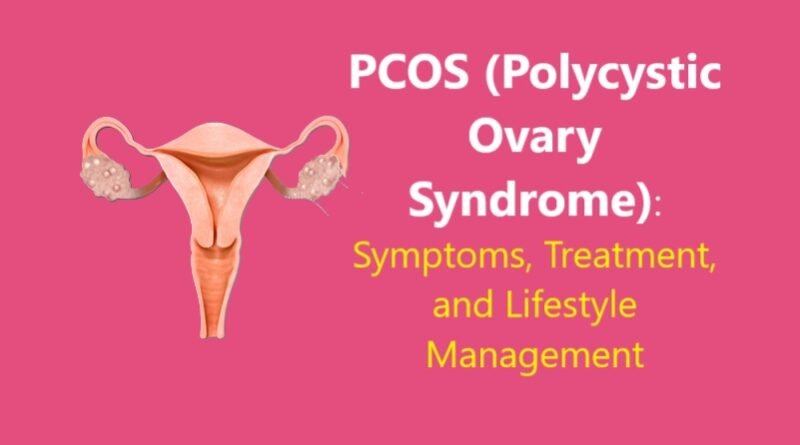PCOS (Polycystic Ovary Syndrome): Symptoms, Treatment, and Lifestyle Management
Introduction
Polycystic Ovary Syndrome (PCOS) is one of the most common hormonal disorders affecting women of reproductive age. It is a complex condition that impacts ovulation, hormone levels, metabolism, and overall health. PCOS can lead to a variety of symptoms, including irregular periods, weight gain, acne, and infertility. While there is no cure, it can be effectively managed through lifestyle changes, medications, and holistic approaches.
Understanding PCOS
PCOS occurs due to an imbalance of reproductive hormones, leading to problems in the ovaries. Women with PCOS typically have higher levels of androgens (male hormones) and insulin resistance, which can disrupt normal ovulation and cause cysts to develop on the ovaries. The exact cause of PCOS is unknown, but genetic, environmental, and lifestyle factors play a role.
Common Symptoms of PCOS
PCOS presents differently in each woman, but some of the most common symptoms include:
- Irregular Periods: Infrequent, prolonged, or absent menstrual cycles.
- Excess Androgen Levels: Leading to acne, excessive facial and body hair (hirsutism), and male-pattern baldness.
- Weight Gain and Difficulty Losing Weight: Many women with PCOS struggle with obesity and insulin resistance.
- Ovarian Cysts: Small fluid-filled sacs that can be seen on ultrasound but do not always cause pain or complications.
- Infertility: Due to irregular ovulation or lack of ovulation altogether.
- Darkened Skin Patches (Acanthosis Nigricans): Often seen on the neck, armpits, or under the breasts, indicating insulin resistance.
- Fatigue and Mood Changes: Depression, anxiety, and difficulty managing stress are also common.
Diagnosis of PCOS
Doctors diagnose PCOS based on the following criteria:
- Irregular or absent menstrual cycles
- Elevated androgen levels (detected through blood tests)
- Polycystic ovaries on ultrasound (not all women with PCOS have cysts)
Additional tests may include checking insulin levels, thyroid function, and cholesterol levels to rule out other conditions.
Treatment Options for PCOS
While PCOS has no definitive cure, its symptoms can be managed through various treatments:
1. Medications
- Hormonal Birth Control: Pills, patches, or rings to regulate periods and reduce androgen symptoms like acne and hair growth.
- Metformin: Often prescribed for insulin resistance, it helps regulate blood sugar levels and may promote weight loss.
- Clomiphene (Clomid) or Letrozole: Used for women trying to conceive by stimulating ovulation.
- Spironolactone: An anti-androgen medication that reduces excessive hair growth and acne.
2. Lifestyle Modifications
A healthy lifestyle plays a crucial role in managing PCOS. Key areas of focus include:
a. Diet and Nutrition
A balanced diet helps regulate insulin levels and maintain hormonal balance. Some dietary recommendations include:
- Low Glycemic Index (GI) Foods: Whole grains, legumes, and non-starchy vegetables.
- Healthy Fats: Avocados, nuts, seeds, and olive oil.
- Lean Proteins: Chicken, fish, tofu, and lentils.
- Reducing Processed Foods and Sugar: To avoid insulin spikes and weight gain.
- Anti-Inflammatory Foods: Berries, turmeric, ginger, and leafy greens to combat inflammation associated with PCOS.
b. Exercise and Physical Activity
Regular exercise helps with weight management and improves insulin sensitivity. Recommended activities include:
- Cardio Workouts: Walking, jogging, swimming, and cycling.
- Strength Training: Lifting weights or bodyweight exercises to improve metabolism.
- Yoga and Pilates: Beneficial for stress reduction and hormonal balance.
c. Stress Management
Chronic stress exacerbates PCOS symptoms by increasing cortisol levels, which can disrupt hormone balance. Strategies to reduce stress include:
- Meditation and Deep Breathing Exercises
- Adequate Sleep (7-9 hours per night)
- Engaging in Hobbies and Relaxing Activities
Natural Remedies and Alternative Therapies
Some women find relief from PCOS symptoms through alternative approaches, such as:
- Herbal Supplements: Spearmint tea, cinnamon, and inositol have shown potential benefits for hormone regulation.
- Acupuncture: May help improve menstrual cycles and reduce stress.
- Essential Oils: Lavender and peppermint oils for stress relief and hormonal support.
Long-Term Health Risks of PCOS
If left unmanaged, PCOS can increase the risk of:
- Type 2 Diabetes due to insulin resistance
- High Blood Pressure and Heart Disease
- Endometrial Cancer due to irregular periods and lack of ovulation
- Sleep Apnea due to weight gain and hormonal imbalances
Conclusion
PCOS is a challenging condition that requires long-term management, but with the right combination of medication, diet, exercise, and stress management, women can lead healthy lives. Consulting a healthcare provider for a personalized approach is crucial to addressing individual symptoms and improving overall well-being. By making informed lifestyle changes, women with PCOS can regain control over their health and fertility.
Disclaimer: This article is for informational purposes only and should not be considered medical advice. If you suspect you have PCOS or are experiencing symptoms, consult a qualified healthcare professional for diagnosis and treatment.

